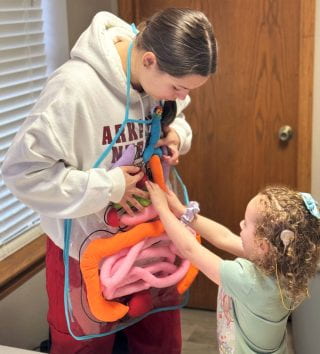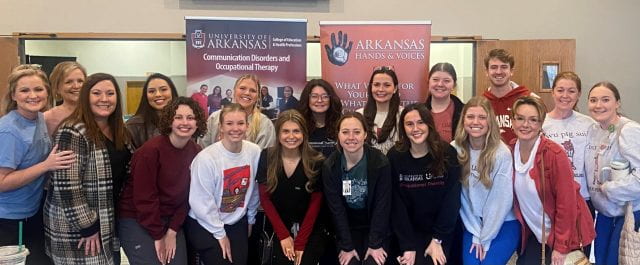Nursing, speech-language pathology, and occupational therapy students in the college recently had the unique opportunity to work with children who have hearing loss and learn from each other at SPARK Day.
The college collaborated with the non-profit Arkansas Hands and Voices, which supports parents and professionals who work with children with hearing loss regardless of their communication approach.
SPARK — an acronym for Student Preparation to care for ARkansas Kids — was partially funded through a WE CARE grant. The college’s future caring professionals engaged in interdisciplinary practice gained clinical experience to meet the requirements of the American Speech-Language-Hearing Association for professional certification. The day also provided clinical training opportunities for those studying to be occupational therapists and nurses.

Katie Spallo, a senior in the Eleanor Mann School of Nursing, works with a child during SPARK Day.
Students completed hearing and health screenings for issues like vision and scoliosis. They also provided fun, age-appropriate activities for the children while parents and professionals who work with children with hearing loss attended the Parent-Professional Summit, held on the same day, Feb. 10.
The keynote speaker for the Northwest Arkansas event was Tina Childress, a deaf audiologist who uses bilateral cochlear implants and is also fluent in American Sign Language. She consults parents and professionals all over the world while working full-time as an educational audiologist in the Chicago area.
“There is no question that our SPARK Day ignited a motivation to learn more about working with children with hearing loss as well as interdisciplinary practice in a variety of settings,” said Rachel Glade, program director for the college’s Communication Sciences and Disorders program. “Students from the communication sciences and disorders, occupational therapy and nursing programs had an opportunity to work together and learn from each other unlike ever before. This event established a foundation for interdisciplinary practice and training opportunities for our students, and we could not be more excited to see what the future might hold.”
Andrea Scott, a master’s student in the Communication Sciences and Disorders program, said the experience enhanced her understanding of the communication development of preschool and elementary-age children who have cochlear implants.
“This was one of my first experiences working with this population,” she said. “The opportunity to observe the differences between a typically developing student and a student born deaf was useful for my future career as a speech-language pathologist. It is vital for SLPs to be knowledgeable in the development of communication across various populations.”
Students were supervised by licensed and certified speech-language pathologists, audiologists, occupational therapists or nurses from the Northwest Arkansas area. After completing their clinical time, they participated in professional development and breakout sessions.
The Arkansas Department of Health Infant Hearing Program reported that over 500 babies did not pass their newborn infant hearing screening in 2021. “This means that over 500 families each year need follow-up care to learn the importance of screening for hearing and how it can impact their child’s communication development,” Glade said.
That same year, the Arkansas Department of Education reported that nearly 4,000 students enrolled in Arkansas schools had hearing loss, and this number is increasing due to poor hearing health habits — such as listening to earbuds with the volume too loud.

Nursing, speech-language pathology and occupational therapy students in the College of Education and Health Professions recently had the unique opportunity to work with children who have hearing loss at SPARK Day.


